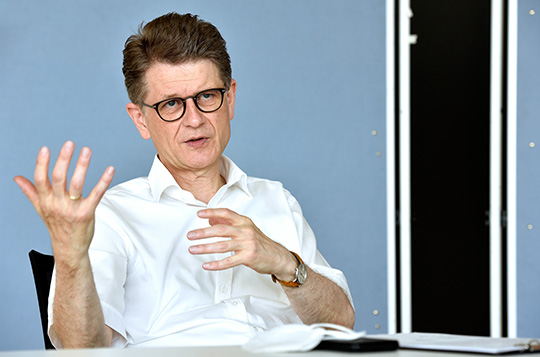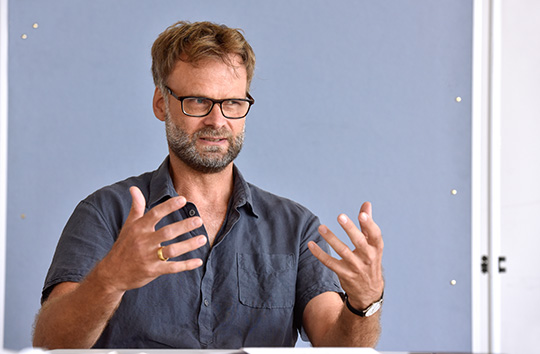Discussion about vaccination for teenagers
Freiburg, Jul 30, 2021
It’s a charged discussion: should children 12 and older be vaccinated to prevent Corona? The Standing Commission on Vaccination (STIKO) has refrained from making a general vaccination recommendation. How did it arrive at its decision? Which factors play a role in the decision-making process in society and politics overall? Jürgen Reuß sat down with Dr. Joachim Boldt from the Institute of Medical Ethics and Medical History and Prof. Dr. Hartmut Hengel, virologist at the University Medical Center who was a member of the STIKO from 2007-2017, to address these questions.

Should children 12 and older be vaccinated to prevent Corona? In Germany, the Standing Commission on Vaccination (STIKO) has refrained from making a general vaccination recommendation. Photo: klavdiyav/stock.adobe.com
Mr. Hengel, how did STIKO come to its non-recommendation?
Hartmut Hengel: STIKO has a clear standard operating procedure committed to the principles of evidence-based medicine. A recommendation as fundamental as this requires a good database. Pure expertise in the sense that one who has an opinion is an expert is out of the question for the STIKO. It is guided by the figures that are available to it. So far, this has been a single study with only a few more than 1000 vaccinated children. For a completely new vaccine principle, with which one has no experience, this is not a sufficient data basis for the assessment of possible vaccination risks, in order to pronounce a recommendation for millions of children. In addition, there is the trade-off between potential vaccination risks and exposure to infection. Because COVID-19 affects children far less, there is reason for caution. Another point, although probably not decisive for STIKO, would be that other people need the vaccine much more urgently. STIKO therefore advocates a prioritized vaccination recommendation and prioritized approach, but unfortunately politicians have abandoned this idea. Therefore, the current recommendation should also be read as a request to politicians to maintain prioritization.
Mr. Boldt, do you, as a medical ethicist, have a different recommendation?
Joachim Boldt: As ethicists, we don't have to recommend vaccination, but when looking at the problem area from an ethical perspective, it is important to clearly sort out what our goal is and what we are trying to achieve. What are we evaluating the available data for? For STIKO, as you pointed out, Mr. Hengel, that is, on the one hand, the individual risk. But there are also other aspects for which vaccination can be relevant, for example, who and where we should vaccinate in order to stop the spread of the disease as effectively as possible. To do this, we would need to gather not only medical but also sociological facts, such as where and in which population strata the virus is spreading. It would not be inconceivable to use such a basis to say that we recommend vaccination in certain urban areas or social groups because that is where the virus spreads fastest. On the basis of such a recommendation, people could then be vaccinated for whom no vaccination recommendation is yet made on a purely individual risk-benefit basis. It is important to make these different goals and possible conflicting goals transparent.
If schools were determined to be hotspots, would vaccination be required there?
Boldt: If that were the case, then that would certainly be an argument for offering vaccinations there if the goal is to quickly stop the spread of the virus in the population. One would then have to weigh up the individual risk and benefit. If the individual risk appears justifiable, it could make sense to increase vaccination there, yes.
Even if we are not yet one hundred percent sure that the vaccination risk is really as low as it is currently estimated?
Boldt: In ethics, different emphases are possible when we are faced with the question of whether the individual risk or the societal benefit should be valued more highly. Such tensions are usually present in ethical considerations and are not easy to resolve. And there is a third consideration, which Mr. Hengel also mentioned: prioritization. As long as there is not enough vaccine for everyone, can we justify giving the vaccine to certain groups, even though their risk of falling ill or suffering serious illnesses is comparatively negligible? So, if in a few weeks or months we have robust data that we can safely vaccinate adolescents, it could still be that we forgo it because we are not yet so far along with vaccination progress in the population that any prioritization can be overridden. Ethical responses are rarely simple.

A single study with only a little more than 1000 vaccinated children is too little, explains Hartmut Hengel: "For a completely new vaccine principle, with which one has no experience, this is not a sufficient data basis for the assessment of possible vaccination risks, in order to pronounce a recommendation for millions of children.” Photo: Thomas Kunz
And how do you reach a decision then?
Boldt: As an ethicist, you have no more exclusive knowledge or competence than other stakeholders in our democratically legitimized and political decision-making processes. A good approach is, of course, always to see whether one cannot find ways that take both values into account. How can you do one without abandoning the other? You can't always do that, but you should try. But when in doubt, you reach a point in which the issue can no longer be solved in this manner. That's when a democratic political decision is needed. That's where we as a society have to decide: What is more important to us? Do we want to protect the elderly from serious illnesses, protect young people from vaccination risks, or do we want to dry up the hotspots as quickly as possible?
Hengel: The trade-offs that Mr. Boldt just described exist. In the end, it will come down to how you weigh community benefit and herd immunity against the risk to those who benefit little from vaccination. That's something that society will have to evaluate. From a medical perspective, we will need childhood vaccination for herd immunity. Otherwise, we're going to keep a constant reservoir of viral circulation that puts those who don't want to get vaccinated or who don't successfully build up vaccine protection at risk. That's why, of course, I hope that in the end we can come to a vaccine recommendation for children based on solid facts about the safety of the vaccines. However, the basic conflict that children rarely get sick from coronaviruses, and therefore benefit much less from vaccination than older people, will still remain.
It is a question of ethics. Why should children and adolescents get vaccinated?
Boldt: The discussion often poses the question the other way around: Why shouldn't they do it? And then the questions is: The young people have now had to put up with so much, can we continue to deprive them of the benefit of vaccination at all? In my view, this is the wrong approach in view of the mild disease courses known so far in children and adolescents and the thin data available on the risks of vaccination in this age group. If you now ask why children should be vaccinated, then it is first and foremost a question of the protection that others who fall more seriously ill receive as a result.
Hengel: This is nothing new. Older people usually have a much higher risk of infection and benefit especially from vaccination of children and adolescents, which creates herd immunity. Getting measles or varicella at age 50 is life-threatening. So how much solidarity do we want and how much o fit can we demand?
What would your answer be?
Hengel: If you explain the reason to young people, they are quite willing to do so. Young people are often more socially minded than older people. That's a question of education and communicating values. But of course the conflicting goals remain.
Vaccinating the elderly and herd immunity through contagion in young people is not enough?
Hengel: In the end, the two will probably merge. What we need is a smooth transition into this early post-pandemic phase. Vaccinations are a great blessing for this. But even with vaccination, we won't be able to get rid of the virus; it will remain.

Joachim Boldt sees society facing difficult decisions: "Do we want to protect the elderly from serious illnesses, protect young people from vaccination risks, or do we want to dry up the hotspots as quickly as possible?” Photo: Thomas Kunz
What recommendations do you have for policymakers?
Boldt: Ideally, such questions should be decided in an all-democratic decision-making process that is as far as possible not characterized by power hierarchies, but by communication free of domination, to use the old catchphrase of the philosopher Habermas. We're a long way from that in politics, but I think it's very important as a fundamental goal to at least work toward making decisions that are legitimized in this way and thus also reasonable. It never happens without pain, and there will always be disputes. But as long as we are in a process in which we try to take this seriously and readjust it if necessary, that's a good thing.
Hengel: The vaccination debate is also so charged because it is about the important fundamental question of where the limits lie for the liberty to decide for ourselves as guaranteed in our constitution. People also have the right to make unreasonable decisions. Do I have the right to be infected? Do I have the right to let my child get sick? As a rational society, we should rely on education and people's ability to discern when dealing with this, not on compulsory vaccination. It would suit our society better. There are very different concepts competing for this worldwide. My Chinese doctoral students are not convinced that our Western model of society is the better one. China is very proud of the fact that it has managed to contain the pandemic very effectively - at what we see as an unaffordably high price in terms of individual freedom. That's a very different way of looking at things.
Instead of debating whether to vaccinate children and adolescents, wouldn't it make more sense to provide vaccine to the regions of the world that need it most?
Hengel: Absolutely. That is entirely in our interest. It is not by chance that the variants come from countries where there is a high incidence of infection. It is completely misguided to think that regional action can control the pandemic in the long term. That will not work. Vaccinations are needed worldwide.
Boldt: That’s another thing that Corona has revealed: we lack supranatinoal structures and actors in the EU, and even more so worldwide, who can take the reins when a pandemic breaks out. The EU has at least managed to initiate a common vaccination procurement policy, but I had hoped that we would be a step further along by now.
Hengel: I think there are many political lessons from the pandemic. If you look at Europe, you see that every country has its own vaccination recommendation. They are not unified. The ability to produce vaccines is completely unevenly distributed. In Germany, we barely had vaccine production anymore; we gave away a lot of competencies in that area. And another thing: The risk of infections, which are becoming globally relevant, is increasing. Not least because of the industrialization of agriculture. If we look at our industrial pig farming, we are creating the best conditions for the next influenza pandemic to start in Germany. We cannot ignore that fact. However, politicians and society like to bury these facts. Science must counteract this.

